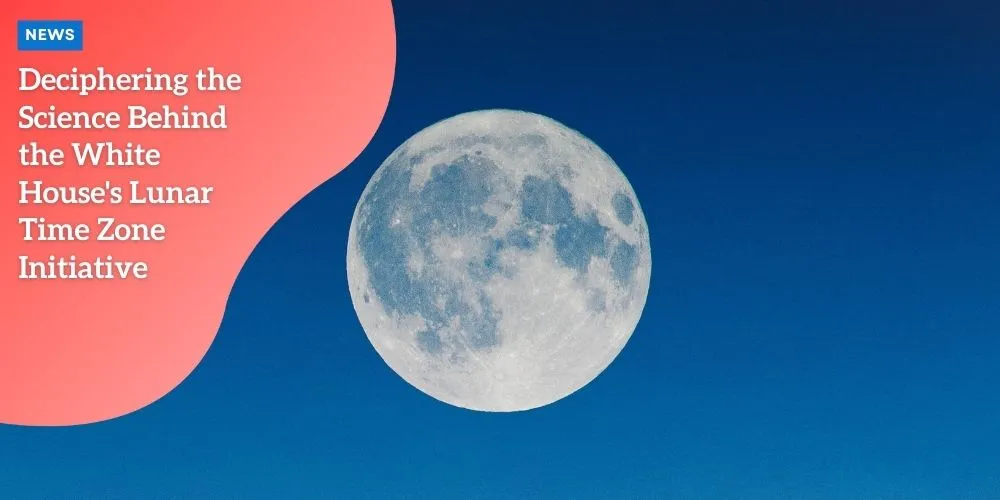Deciphering the Science Behind the White House’s Lunar Time Zone Initiative

A Moon Clock of Our Own: Why Lunar Coordinated Time is Crucial for Space Exploration
Anúncios
As humanity’s presence on the Moon steadily increases, from robotic landers to ambitious plans for crewed missions, the need for a unified and accurate lunar timekeeping system becomes more urgent.
Lunar Coordinated Time (LTC) is a revolutionary proposal that could completely transform how we approach navigation, communication, and coordination on the Moon.
But why does a dedicated lunar time zone matter, and what implications does it have for the future of space exploration? Let’s dive deep into the intricacies of lunar timekeeping and examine why it’s crucial for missions both now and in the future.
Anúncios
The Curious Case of Lunar Time Dilation: When Seconds Don’t Quite Match Up
Time, as we know it, isn’t an absolute, universal constant.
While it may feel that the seconds on Earth tick by the same everywhere, the truth is far more complex.
Time is intricately linked to gravity—specifically, how strong the gravitational field is in a given location.
Anúncios
On Earth, time is influenced by our planet’s gravity, which is much stronger than that of the Moon.
As a result, time on the lunar surface actually runs a tiny bit faster than on Earth.
Specifically, lunar time flows about 58.7 microseconds faster per day due to the Moon’s weaker gravitational pull.
At first glance, this time difference might seem trivial.
After all, microseconds are fractions of a second, and a difference of less than 60 microseconds in a single day seems negligible.
However, in the realm of space exploration, where precision is paramount, these tiny discrepancies can snowball into significant issues over time.
Microseconds with Macro Consequences: The Ripple Effect of Time Discrepancy
While the discrepancy between Earth and lunar time might seem negligible for day-to-day activities, its cumulative effect becomes increasingly problematic during longer lunar missions.
For example, over the course of a typical 30-day lunar mission, the discrepancy in time adds up to nearly 1.8 milliseconds.
Over the course of a year, this difference could be as much as 22 milliseconds, which might sound even more trivial.
However, in the world of space exploration, where missions are often dependent on the precise synchronization of atomic clocks for navigation, timing, and communication, even these small discrepancies can result in dangerous errors.
Lunar missions involve the use of highly accurate atomic clocks that help spacecraft and lunar modules maintain precise locations and timings as they orbit and land on the Moon.
If these clocks are not properly synchronized to account for lunar time dilation, navigational errors could accumulate over time, leading to miscalculations in positioning, communication failures, and potentially catastrophic consequences for both astronauts and robotic systems.
Einstein’s Theory in Action: Gravity’s Influence on the Flow of Time
To truly understand why lunar time runs faster, we must delve into the physics that govern how gravity affects the passage of time.
Albert Einstein’s theory of general relativity explains that gravity can warp the fabric of spacetime itself.
The stronger the gravitational pull, the slower time flows.
Conversely, in areas with weaker gravitational fields, such as the Moon, time flows faster.
This is known as gravitational time dilation.
On Earth, the effect is negligible because the difference between the strength of gravity at sea level and the height of a building is minimal.
However, when we step outside of Earth’s atmosphere and venture to the Moon, where gravity is only about 1/6th of Earth’s, the difference in time becomes more pronounced.
This is why we must take lunar time dilation into account for accurate synchronization, particularly when dealing with technologies that rely on the precise measurement of time.
Beyond Bureaucracy: The Necessity for a Lunar Time Zone
The question of timekeeping on the Moon might seem like an abstract concern, a bureaucratic detail that can be easily ignored or postponed.
However, this could not be further from the truth.
Imagine the complexity of coordinating activities between mission control on Earth and astronauts on the Moon, without a reliable way to synchronize time.
Communications, scheduling, and data transmission would become a logistical nightmare.
Without a lunar time zone, every communication between Earth and the Moon would need to account for the time discrepancy.
Scheduling daily activities would become an arduous task, with engineers, scientists, and astronauts having to manually adjust for the differences.
Time is essential for everything, from launching spacecraft to conducting scientific experiments, and even the basic act of communicating across vast distances.
LTC is not just a technical convenience; it’s a crucial component of mission planning.
The development of LTC is an essential step toward ensuring the efficiency, accuracy, and safety of all lunar operations.
It will provide a standardized time reference that ensures that all parties involved in lunar activities—whether they be astronauts, scientists, or engineers—are working from the same temporal framework.
Precision is Key: Navigating the Lunar Time Warp
As space exploration ventures further beyond Earth, precision becomes more than just a preference—it’s a matter of survival.
This is especially true for missions that involve landing on and exploring the Moon.
For example, NASA’s Artemis program, which aims to land humans on the Moon by the mid-2020s, will rely heavily on precise timing.
Docking spacecraft, performing extravehicular activities (EVAs), and operating scientific instruments all demand synchronization to ensure success.
Lunar Coordinated Time (LTC) will play a crucial role in the successful execution of these missions.
It will allow spacecraft and lunar landers to operate in unison, despite the 384,400 km distance between Earth and the Moon.
Every second counts when landing spacecraft or coordinating rovers and other robotic systems.
With LTC in place, all spacefaring entities—whether governmental agencies like NASA, private companies like SpaceX, or international partners—will be able to synchronize their efforts with pinpoint accuracy.
A Global Village on the Moon: Collaboration and Governance of LTC
The implementation of LTC represents a monumental step in international cooperation.
Just as Earth’s timekeeping systems are governed by the International Bureau of Weights and Measures (BIPM), LTC will require a similar governing body to ensure that lunar time is standardized and universally accepted.
Lunar exploration, unlike past space programs that were primarily national in scope, is increasingly a global endeavor.
The involvement of private companies, like SpaceX, Blue Origin, and others, adds an additional layer of complexity.
Ensuring that LTC is universally adopted will require collaboration not only between governmental space agencies but also between private entities, international organizations, and scientific communities.
This global governance of LTC is essential not just for technical accuracy but for maintaining peace and cooperation in space.
A single, unified timekeeping system on the Moon would help foster a cooperative spirit and reduce the chances of conflicts arising over operational misalignments.
Charting New Territory: The Technical Implementation of LTC
Creating an entirely new timekeeping system for the Moon is no small feat.
It involves overcoming significant technical challenges.
First and foremost, the creation of a network of highly accurate, synchronized atomic clocks will be necessary.
These clocks will need to account for the Moon’s unique gravitational environment, which requires careful calibration.
Additionally, the Moon’s surface presents other challenges, such as the lack of an atmosphere for protecting instruments from radiation, temperature extremes, and other environmental factors that could affect timekeeping equipment.
Communication systems will also need to be adapted to account for the lunar time discrepancy.
Current communication protocols rely heavily on Earth-based time standards, which will need to be adjusted for lunar missions.
This includes ensuring that the systems used to transmit data and instructions between the Moon and Earth are capable of factoring in the differences in time flow between the two bodies.
Beyond Timekeeping: The Broader Benefits of LTC
The importance of LTC extends far beyond merely tracking seconds on the Moon.
It serves as a foundational element for building a cohesive lunar infrastructure.
As we move toward establishing a permanent human presence on the Moon, including lunar bases, mining operations, and scientific research stations, the need for a standardized timekeeping system will only grow.
Standardized lunar time will not only improve efficiency but also minimize human error and communication breakdowns.
It will streamline operations, reduce the potential for costly mistakes, and enable faster decision-making.
With LTC in place, the Moon will become a more predictable, manageable environment, allowing humanity to focus on expanding its presence in space.
Investing in the Future: A Call to Action for LTC Support
Supporting the implementation of LTC isn’t just about adopting a new timekeeping system.
It’s about recognizing the critical role that time plays in the success of future space missions.
By committing to LTC, we are laying the groundwork for a future in which space exploration becomes safer, more efficient, and more collaborative.
Lunar Coordinated Time will provide a steady rhythm to the Moon’s operations, ensuring that everything from crewed missions to robotic explorers operates in harmony. As we stand on the brink of a new era of lunar exploration, LTC represents a crucial piece of the puzzle, one that will enable us to unlock the full potential of humanity’s presence on the Moon.
With LTC, we’re not just measuring time—we’re creating the foundation for humanity’s future in space.
In the coming decades, when astronauts step onto the Moon and collaborate on groundbreaking scientific discoveries, LTC will be there, ensuring that every step they take is in sync with the universal pulse of the Moon.
The future is bright, and it’s ticking with precision.





